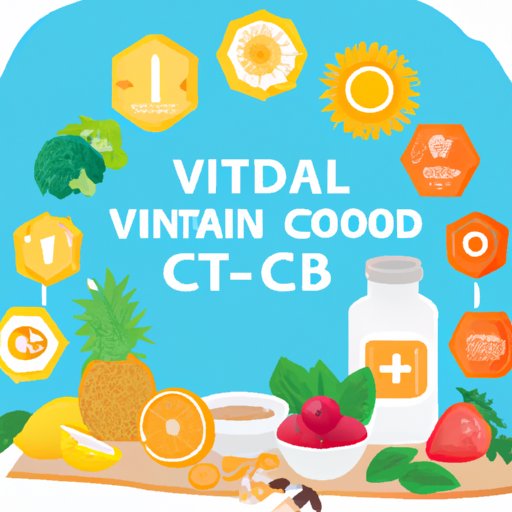Introduction
Vitamin C, also known as ascorbic acid, is a water-soluble vitamin found in many foods. It is an essential micronutrient that aids in various metabolic processes and plays a vital role in overall health. As with all vitamins, it’s important to get enough of it from your diet or other sources to ensure your body functions properly. But how much vitamin C do you need? This article will explore the recommended dietary allowance (RDA) for vitamin C and provide information on sources of the vitamin.

Benefits of Vitamin C Intake
Vitamin C is essential for health and wellbeing. Here are some of the benefits associated with adequate vitamin C intake:
Role in Immune System Health
Vitamin C helps keep your immune system functioning optimally. It helps to produce white blood cells, which are important for fighting infection. Vitamin C can also help reduce the severity and duration of common colds and other infections.
Contribution to Cardiovascular Health
Vitamin C plays an important role in keeping your heart healthy by helping to reduce inflammation and oxidation. It can also help lower blood pressure levels and improve cholesterol levels.
Impact on Skin Health
Vitamin C is important for skin health and beauty. It helps support collagen production, which helps keep skin looking firm and youthful. Vitamin C can also help protect your skin from sun damage, pollution, and other environmental factors.
Sources of Vitamin C in Your Diet
You can get vitamin C from a variety of sources. Here are some of the best sources of vitamin C:
Fruits and Vegetables
Fruits and vegetables are the best sources of vitamin C. Citrus fruits like oranges, lemons, and grapefruits are especially high in vitamin C, as are berries, kiwi, cantaloupe, papaya, mango, cabbage, spinach, kale, potatoes, tomatoes, Brussels sprouts, cauliflower, and bell peppers.
Supplements
If you cannot get enough vitamin C from your diet, consider taking a vitamin C supplement. Supplements are available in tablet, capsule, or liquid form. Make sure to buy a reputable brand and follow the directions for use carefully.
Fortified Foods
Some foods are fortified with vitamin C. Examples include breakfast cereals, juices, and breads. Be sure to read the label to make sure the food contains vitamin C.

Comparing Vitamin C Requirements for Different Age Groups
The amount of vitamin C you need varies depending on your age. Here are the recommended dietary allowances (RDAs) for vitamin C for different age groups:
Infants
0-6 months: 40 mg/day
7-12 months: 50 mg/day
Children
1-3 years: 15 mg/day
4-8 years: 25 mg/day
9-13 years: 45 mg/day
Adults
Men: 90 mg/day
Women: 75 mg/day
Pregnant and Breastfeeding Women
Pregnant women: 85 mg/day
Breastfeeding women: 120 mg/day

Determining How Much Vitamin C Is Necessary for Good Health
It’s important to get enough vitamin C to maintain good health. Here are some tips for determining how much vitamin C you need:
Examining the RDA
The first step is to look at the RDAs for your age group and gender. This will give you an idea of the amount of vitamin C you should aim for each day.
Taking into Account Other Factors
Your individual needs may vary based on lifestyle factors such as stress level, exercise habits, and smoking status. If you are exposed to more oxidative stress, for example, you may need to consume more vitamin C than the RDA recommends.
Consulting with a Doctor or Nutritionist
If you have any concerns about your vitamin C intake, it’s a good idea to consult with a doctor or nutritionist. They can help you determine the right amount of vitamin C for your individual needs.
Conclusion
Vitamin C is an essential nutrient for good health. Knowing the recommended dietary allowance (RDA) for vitamin C and where to find it in your diet are important steps towards ensuring you get enough of this essential nutrient. By understanding your individual needs and consulting with a doctor or nutritionist, you can make sure you’re getting the right amount of vitamin C for optimal health.


